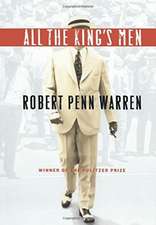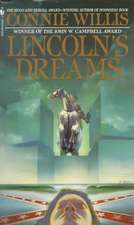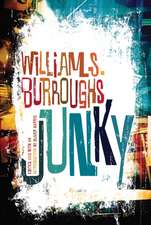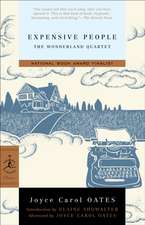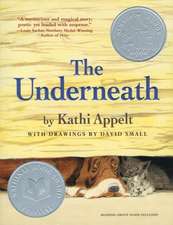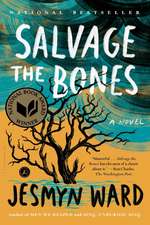Pandemonium
Autor Daryl Gregoryen Limba Engleză Paperback – 31 iul 2008
As a boy, Del Pierce is possessed by the Hellion, an entity whose mischief-making can be deadly. With the help of Del’s family and a caring psychiatrist, the demon is exorcised . . . or is it? Years later, following a car accident, the Hellion is back, trapped inside Del’s head and clamoring to get out.
Del’s quest for help leads him to Valis, an entity possessing the science fiction writer formerly known as Philip K. Dick; to Mother Mariette, a nun who inspires decidedly unchaste feelings; and to the Human League, a secret society devoted to the extermination of demons. All believe that Del holds the key to the plague of possession–and its solution. But for Del, the cure may be worse than the disease.
“Look out, Lethem! Daryl Gregory mixes pop culture and pathos, flavoring it with Philip K. Dick. Pandemonium possesses every quality you want in a great novel, and the good news is it’s only his debut.”
–Charles Coleman Finlay, Hugo and Nebula Award-nominated author of The Prodigal Troll
Preț: 102.40 lei
Nou
Puncte Express: 154
Preț estimativ în valută:
19.60€ • 20.38$ • 16.18£
19.60€ • 20.38$ • 16.18£
Carte disponibilă
Livrare economică 22 martie-05 aprilie
Preluare comenzi: 021 569.72.76
Specificații
ISBN-13: 9780345501165
ISBN-10: 0345501160
Pagini: 288
Dimensiuni: 141 x 209 x 18 mm
Greutate: 0.25 kg
Editura: BALLANTINE BOOKS
ISBN-10: 0345501160
Pagini: 288
Dimensiuni: 141 x 209 x 18 mm
Greutate: 0.25 kg
Editura: BALLANTINE BOOKS
Extras
1
The woman next to me said, It’s the Kamikaze. Someone else said, No, it’s the Painter—the Painter or the Fat Boy.
The river of people leaving the gates had log-jammed against a line of cops, and rumor rippled back through the crowd. A demon had possessed a man, and O’Hare security had sealed off the concourse between the gates and baggage claim. Reactions varied from exasperation to excitement. It was another travel delay, but at least it was an interesting delay.
I could see nothing beyond the end of the crowd but the cops’ blue shoulders and the cavernous space of the United terminal. We couldn’t go back: we’d just come through security, and more travelers were filling in behind us. There was nothing to do but wait for the demon to finish its business.
I dropped my blue nylon duffel bag between my feet and sat astride it, surrounded by a forest of legs and luggage. The scraping sensation in my head, quiet since morning, started up again. I stared at my shoes and tried to take clarifying breaths. My last doctor was big on clarifying breaths—that, and heavy meds.
I was tired. I’d been traveling all day, flying standby and catching one flight for every three, portaging the duffel through three airports, three sets of security shakedowns. At least I wasn’t Japanese. Those poor bastards were practically strip-searched at every gate.
Someone backed into me, stumbled, and moved aside. I looked up, and the crowd shifted backward like spooked cattle. A path opened through the bodies, and suddenly I was alone in the middle of an aisle with the possessed man running toward me.
He was naked to the waist, his skinny chest and arms coated with gray dust, eyes wide and happy. He grinned, his mouth making words I couldn’t hear. I got out of his way, leaving my bag in the middle of the floor.
He veered suddenly toward a popcorn vendor cart. Parents yanked children out of his way; people scattered. The crowd’s mood had lurched from morbid curiosity to outright fear. A demon five hundred yards away was a lot different than one in your face.
He grabbed the cart by its handles and tipped it easily with the cartoon strength of the possessed. Someone screamed. The glass case shattered. Yellow popcorn blossomed into the air, and a metal pan bounced off the tile and rolled away like a hubcap.
The possessed man cackled and began to scoop up the popcorn, ignoring the shards of glass. He rose into a squat, arms full, and winked at me conspiratorially. His hands were bloody. He staggered back the way he’d come, hunched over his load. The cop let him pass without making a move.
What else could he do? He couldn’t shoot the guy. It wasn’t his fault, and if they obstructed him the demon might get pissed, jump to someone else (like a cop with a gun), and start hurting people. Nothing to do but keep the gawkers back and wait for it to burn itself out.
I picked up my bag and walked forward—plenty of room at the front of the line now—until I’d reached the temporary barrier, a ribbon of nylon strung between plastic posts. There was no one between me and the demon but a line of cops.
The United terminal was an art deco cathedral of steel and glass, shining ribs arcing under blue glass. I’d always liked it. The demon, trailing puffs of popcorn, shuffled to the middle of the concourse, stopped between the Starbucks and the shrine to the Kamikaze, and opened his arms. The popcorn spread over the marble with a susurrant huff.
He surveyed the mess for a moment, and then began to dance. He crushed the popcorn beneath his glossy black shoes. He paused, then danced again. When he was satisfied he dropped to hands and knees and began pushing the yellow powder into the borders of his sand painting, his collage, his sculpture—whatever the hell it was.
What it was, though, was a farm: a quaint white farmhouse, a red silo and barn, a line of trees, wide open fields. The farmhouse was powdered detergent or sugar or salt; the silo bits of red plastic and glass that could have been plucked from smashed exit signs; the trees cunningly arranged candy wrappers and strips of Styrofoam from coffee cups and junk food packages. The crumbled popcorn became the edge of a wheat field. The picture was simultaneously naturalistic and hazily distorted, a landscape seen through waves of heat.
The demon began to add details. I sat down on my duffel and watched him work. He fiddled with the shards of red glass to suggest the warp of barn wood; gently blew the white powder into the ghosts of gutters and window frames; scraped his shoe heel against the marble to create a smudge above the house that could have been a cloud or a large bird. The longer he worked, the more familiar the scene became. I’d never seen the place before—at least, I didn’t remember ever seeing a farm like this—but the picture was so relentlessly quaint, so Norman Rockwell, that maybe it was the idea of the farm that I recognized. The Jungians thought demons were archetypes from the collective unconscious. Perhaps the subject matter of archetypal artists was archetypes.
And then he abruptly stood and walked away, not even glancing back at the finished picture. The man took maybe a dozen steps, and then collapsed. No one moved for perhaps a minute.
Finally a cop edged forward, his hand on his nightstick, and asked the man questions I couldn’t catch. The man looked up, frightened. The cop helped him to his feet, and the man looked at his cut hands, then around at the crowds. The cop put an arm around his shoulder and led him away.
. . .
“Del!”
Lew, My Very Bigger Brother, bellowing from the other end of the atrium. His wife, Amra, shook her head in mock embarrassment. This was part of their shtick: Lew was loud and embarrassing, Amra was socially appropriate.
Lew met me halfway across the floor and grabbed me in a hug, his gut hitting me like a basketball. He’d always been bigger than me, but now he was six inches taller and a hundred pounds heavier. “Jesus Christ!” he said. “What took you so long? The board said your flight got in an hour ago.” His beard was bushier than when I’d last seen him a year and a half ago, but it had still failed to colonize the barren patches between ear and chin.
“Sorry about that—something about four bags of heroin up my ass. Hey, Amra.”
“Hello, Del.”
I hugged her briefly. She smelled good as always. She’d cut her long, shiny black hair into something short and professional.
Lew grabbed the strap from my shoulder and tried to take it from me. “I got it,” I said.
“Come on, you look like you haven’t slept in a week.” He yanked it from me. “Shit, this is heavy. How many more bags do you got?”
“That’s it.”
“What are you, a fuckin’ hobo? Okay, we have to take a shuttle to the parking garage. Follow me.” He charged ahead with the duffel on his back.
“Did you hear there was a demon in the airport?” Amra said.
“I was there. They wouldn’t let us out of the terminal until he was gone. So what happened to the Cher hair?”
“Oh . . .” She made a gesture like shooing a fly. “Too much. You saw it? Which one was it—not the Kamikaze?” The news tracked them by name, like hurricanes. Most people went their whole lives without seeing one in person. I’d seen five—six, counting today’s. I’m lucky that way.
“The Painter, I think. At least, it was making a picture.”
Lew glanced back, gave Amra a look. He wanted her to stop talking about it. “Probably a faker,” Lew said. “There’s a possession conference going on downtown next week. The town’ll be full of posers.”
“I don’t think this guy was faking,” I said. That mad grin. That wink. “Afterward he was just crushed. Totally confused.”
“I wonder if he even knows how to draw,” Amra said.
The tram dropped us at a far parking lot, and then we shivered in the wind while Lew unlocked the car and loaded my duffel into the tiny trunk.
It was new, a bulbous silver Audi that looked futuristic and fast. I thought of my own car, crumpled like a beer can, and tried not to be jealous. The Audi was too small for Lew anyway. He enveloped the steering wheel, elbows out, like he was steering with his stomach. His seat was pushed all the way back, so I sat behind Amra. Lew flew down 294, swearing at drivers and juking between lanes. I should have been used to Lew’s driving by then, but the speed and erratic turns had me gripping the back of Amra’s seat. I grew up in the suburbs, but every time I came back to Chicago I experienced traffic shock. We were forty minutes from downtown, and there were four crammed lanes on each side of the road, and everyone moving at 70 mph. It was worse than Denver.
“So what have you been doing with yourself?” Lew asked. “You don’t call, you don’t write, you don’t send flowers . . .”
“We missed you at Christmas,” Amra said.
“See, Lew? From Amra, that actually means she missed me at Christmas. From you or Mom that would have meant ‘How could you have let us down like that?’ ”
“Then she said it wrong.”
They’d only been married for a year and a half, but they’d been dating on and off—mostly on—since college. “So when are you guys going to settle down and make Mom some multiracial grandbabies? The Cyclops has gotta be demanding a little baby action.”
Amra groaned. “Do you have to call her that? And you’re changing the subject.”
“Yeah,” Lew said. “Back to your faults as a son and brother. What have you been up to?”
“Well, that’s a funny story.”
Lew glanced at me in the rearview mirror. Amra turned in her seat to face me, frowning in concern.
“Jeez, guys.” I forced a smile. “Can you at least let me segue into this?”
“What is it?” Amra said.
“It’s not a big deal. I had a car accident in November, went through a guardrail in the snow, and then—”
Lew snorted in surprise. “Were you drunk?”
“Fuck you. The road was icy, and I just hit the curve too fast and lost control. I went through the rail, and then the car started flipping.” My gut tightened, remembering that jolt. My vision had gone dark as I struck the rail, and I’d felt myself pitching forward, as if I were being sucked into a black well. “I ended up at the bottom of a ravine, upside down, and I couldn’t get my seatbelt undone.” I left out the caved-in roof, the icy water running through the car, my blind panic. “I just hung there until the cops got me out.”
“Weren’t you hurt?” Amra asked.
I shrugged. “My arms were scraped up, and my back was killing me, but that turned out to be just a pulled muscle. They kept me in the hospital for a day, and then they let me go. And afterward . . . well, all in all I was pretty lucky.”
“Lucky?” Lew said. “Why do people say that? You get a tumor, and if it turns out that you can operate on it, people say, gee, that was lucky. No, lucky is not getting cancer. Lucky is not getting cancer, then finding ten bucks in your shoe.”
“Are you done?” Amra said.
“He totaled his car. He’s not that lucky.”
Amra shook her head. “You were about to say something else, Del. What happened after the accident?”
“Yeah, afterward.” I suddenly regretted bringing it up. I’d thought I could practice on Lew and Amra, get ready for the main event with Mom. Amra looked at me expectantly.
The woman next to me said, It’s the Kamikaze. Someone else said, No, it’s the Painter—the Painter or the Fat Boy.
The river of people leaving the gates had log-jammed against a line of cops, and rumor rippled back through the crowd. A demon had possessed a man, and O’Hare security had sealed off the concourse between the gates and baggage claim. Reactions varied from exasperation to excitement. It was another travel delay, but at least it was an interesting delay.
I could see nothing beyond the end of the crowd but the cops’ blue shoulders and the cavernous space of the United terminal. We couldn’t go back: we’d just come through security, and more travelers were filling in behind us. There was nothing to do but wait for the demon to finish its business.
I dropped my blue nylon duffel bag between my feet and sat astride it, surrounded by a forest of legs and luggage. The scraping sensation in my head, quiet since morning, started up again. I stared at my shoes and tried to take clarifying breaths. My last doctor was big on clarifying breaths—that, and heavy meds.
I was tired. I’d been traveling all day, flying standby and catching one flight for every three, portaging the duffel through three airports, three sets of security shakedowns. At least I wasn’t Japanese. Those poor bastards were practically strip-searched at every gate.
Someone backed into me, stumbled, and moved aside. I looked up, and the crowd shifted backward like spooked cattle. A path opened through the bodies, and suddenly I was alone in the middle of an aisle with the possessed man running toward me.
He was naked to the waist, his skinny chest and arms coated with gray dust, eyes wide and happy. He grinned, his mouth making words I couldn’t hear. I got out of his way, leaving my bag in the middle of the floor.
He veered suddenly toward a popcorn vendor cart. Parents yanked children out of his way; people scattered. The crowd’s mood had lurched from morbid curiosity to outright fear. A demon five hundred yards away was a lot different than one in your face.
He grabbed the cart by its handles and tipped it easily with the cartoon strength of the possessed. Someone screamed. The glass case shattered. Yellow popcorn blossomed into the air, and a metal pan bounced off the tile and rolled away like a hubcap.
The possessed man cackled and began to scoop up the popcorn, ignoring the shards of glass. He rose into a squat, arms full, and winked at me conspiratorially. His hands were bloody. He staggered back the way he’d come, hunched over his load. The cop let him pass without making a move.
What else could he do? He couldn’t shoot the guy. It wasn’t his fault, and if they obstructed him the demon might get pissed, jump to someone else (like a cop with a gun), and start hurting people. Nothing to do but keep the gawkers back and wait for it to burn itself out.
I picked up my bag and walked forward—plenty of room at the front of the line now—until I’d reached the temporary barrier, a ribbon of nylon strung between plastic posts. There was no one between me and the demon but a line of cops.
The United terminal was an art deco cathedral of steel and glass, shining ribs arcing under blue glass. I’d always liked it. The demon, trailing puffs of popcorn, shuffled to the middle of the concourse, stopped between the Starbucks and the shrine to the Kamikaze, and opened his arms. The popcorn spread over the marble with a susurrant huff.
He surveyed the mess for a moment, and then began to dance. He crushed the popcorn beneath his glossy black shoes. He paused, then danced again. When he was satisfied he dropped to hands and knees and began pushing the yellow powder into the borders of his sand painting, his collage, his sculpture—whatever the hell it was.
What it was, though, was a farm: a quaint white farmhouse, a red silo and barn, a line of trees, wide open fields. The farmhouse was powdered detergent or sugar or salt; the silo bits of red plastic and glass that could have been plucked from smashed exit signs; the trees cunningly arranged candy wrappers and strips of Styrofoam from coffee cups and junk food packages. The crumbled popcorn became the edge of a wheat field. The picture was simultaneously naturalistic and hazily distorted, a landscape seen through waves of heat.
The demon began to add details. I sat down on my duffel and watched him work. He fiddled with the shards of red glass to suggest the warp of barn wood; gently blew the white powder into the ghosts of gutters and window frames; scraped his shoe heel against the marble to create a smudge above the house that could have been a cloud or a large bird. The longer he worked, the more familiar the scene became. I’d never seen the place before—at least, I didn’t remember ever seeing a farm like this—but the picture was so relentlessly quaint, so Norman Rockwell, that maybe it was the idea of the farm that I recognized. The Jungians thought demons were archetypes from the collective unconscious. Perhaps the subject matter of archetypal artists was archetypes.
And then he abruptly stood and walked away, not even glancing back at the finished picture. The man took maybe a dozen steps, and then collapsed. No one moved for perhaps a minute.
Finally a cop edged forward, his hand on his nightstick, and asked the man questions I couldn’t catch. The man looked up, frightened. The cop helped him to his feet, and the man looked at his cut hands, then around at the crowds. The cop put an arm around his shoulder and led him away.
. . .
“Del!”
Lew, My Very Bigger Brother, bellowing from the other end of the atrium. His wife, Amra, shook her head in mock embarrassment. This was part of their shtick: Lew was loud and embarrassing, Amra was socially appropriate.
Lew met me halfway across the floor and grabbed me in a hug, his gut hitting me like a basketball. He’d always been bigger than me, but now he was six inches taller and a hundred pounds heavier. “Jesus Christ!” he said. “What took you so long? The board said your flight got in an hour ago.” His beard was bushier than when I’d last seen him a year and a half ago, but it had still failed to colonize the barren patches between ear and chin.
“Sorry about that—something about four bags of heroin up my ass. Hey, Amra.”
“Hello, Del.”
I hugged her briefly. She smelled good as always. She’d cut her long, shiny black hair into something short and professional.
Lew grabbed the strap from my shoulder and tried to take it from me. “I got it,” I said.
“Come on, you look like you haven’t slept in a week.” He yanked it from me. “Shit, this is heavy. How many more bags do you got?”
“That’s it.”
“What are you, a fuckin’ hobo? Okay, we have to take a shuttle to the parking garage. Follow me.” He charged ahead with the duffel on his back.
“Did you hear there was a demon in the airport?” Amra said.
“I was there. They wouldn’t let us out of the terminal until he was gone. So what happened to the Cher hair?”
“Oh . . .” She made a gesture like shooing a fly. “Too much. You saw it? Which one was it—not the Kamikaze?” The news tracked them by name, like hurricanes. Most people went their whole lives without seeing one in person. I’d seen five—six, counting today’s. I’m lucky that way.
“The Painter, I think. At least, it was making a picture.”
Lew glanced back, gave Amra a look. He wanted her to stop talking about it. “Probably a faker,” Lew said. “There’s a possession conference going on downtown next week. The town’ll be full of posers.”
“I don’t think this guy was faking,” I said. That mad grin. That wink. “Afterward he was just crushed. Totally confused.”
“I wonder if he even knows how to draw,” Amra said.
The tram dropped us at a far parking lot, and then we shivered in the wind while Lew unlocked the car and loaded my duffel into the tiny trunk.
It was new, a bulbous silver Audi that looked futuristic and fast. I thought of my own car, crumpled like a beer can, and tried not to be jealous. The Audi was too small for Lew anyway. He enveloped the steering wheel, elbows out, like he was steering with his stomach. His seat was pushed all the way back, so I sat behind Amra. Lew flew down 294, swearing at drivers and juking between lanes. I should have been used to Lew’s driving by then, but the speed and erratic turns had me gripping the back of Amra’s seat. I grew up in the suburbs, but every time I came back to Chicago I experienced traffic shock. We were forty minutes from downtown, and there were four crammed lanes on each side of the road, and everyone moving at 70 mph. It was worse than Denver.
“So what have you been doing with yourself?” Lew asked. “You don’t call, you don’t write, you don’t send flowers . . .”
“We missed you at Christmas,” Amra said.
“See, Lew? From Amra, that actually means she missed me at Christmas. From you or Mom that would have meant ‘How could you have let us down like that?’ ”
“Then she said it wrong.”
They’d only been married for a year and a half, but they’d been dating on and off—mostly on—since college. “So when are you guys going to settle down and make Mom some multiracial grandbabies? The Cyclops has gotta be demanding a little baby action.”
Amra groaned. “Do you have to call her that? And you’re changing the subject.”
“Yeah,” Lew said. “Back to your faults as a son and brother. What have you been up to?”
“Well, that’s a funny story.”
Lew glanced at me in the rearview mirror. Amra turned in her seat to face me, frowning in concern.
“Jeez, guys.” I forced a smile. “Can you at least let me segue into this?”
“What is it?” Amra said.
“It’s not a big deal. I had a car accident in November, went through a guardrail in the snow, and then—”
Lew snorted in surprise. “Were you drunk?”
“Fuck you. The road was icy, and I just hit the curve too fast and lost control. I went through the rail, and then the car started flipping.” My gut tightened, remembering that jolt. My vision had gone dark as I struck the rail, and I’d felt myself pitching forward, as if I were being sucked into a black well. “I ended up at the bottom of a ravine, upside down, and I couldn’t get my seatbelt undone.” I left out the caved-in roof, the icy water running through the car, my blind panic. “I just hung there until the cops got me out.”
“Weren’t you hurt?” Amra asked.
I shrugged. “My arms were scraped up, and my back was killing me, but that turned out to be just a pulled muscle. They kept me in the hospital for a day, and then they let me go. And afterward . . . well, all in all I was pretty lucky.”
“Lucky?” Lew said. “Why do people say that? You get a tumor, and if it turns out that you can operate on it, people say, gee, that was lucky. No, lucky is not getting cancer. Lucky is not getting cancer, then finding ten bucks in your shoe.”
“Are you done?” Amra said.
“He totaled his car. He’s not that lucky.”
Amra shook her head. “You were about to say something else, Del. What happened after the accident?”
“Yeah, afterward.” I suddenly regretted bringing it up. I’d thought I could practice on Lew and Amra, get ready for the main event with Mom. Amra looked at me expectantly.
Descriere
A brilliant debut novel from a rising star in fantasy and science fiction, this modern fantasy is a wild ride through the American cultural landscape.




